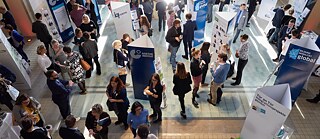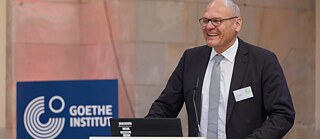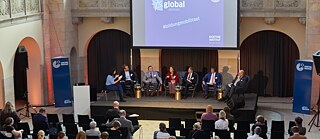Conference Vocational Education and Labour Mobility – Think Globally!
“All we need to do is act!”

Robots not welcome: The Goethe-Institut’s conference “Vocational Education and Labour Mobility – Think Globally!” focused on international collaboration in the context of the migration of skilled personnel.
By Kristina von Klot
It’s common sense that Germany considers itself an immigration country. It’s also undisputed that demographic change and a massive decline in the supply of labour in the Federal Republic are leading to an additional need for qualified professionals from abroad. According to a study by the Bertelsmann Foundation, the immigration requirement is for 260,000 people each year by 2060. But even when the new Skilled Labour Immigration Act enters into force on 1 March 2020, what can be improved at an institutional level and how international cooperation in training and qualification can be optimised remains to be seen.

Mastering structural challenges together
With the goal of giving these questions a podium, the Goethe-Institut hosted a conference in Berlin at the end of October. At the conference entitled “Vocational Education and Labour Mobility – Think Globally!”, representatives from academia, industry, politics and society were able to discuss various framework conditions and offers in the origin and destination countries in three workshops in order to consider a new need for action and possible levers. For example, 200,000 qualified skilled workers for the trades alone are lacking in Germany. It’s a structural challenge because immigrant workers obtain their professional training in very different national training systems, so that recognition in the destination country is often hampered by bureaucratic hurdles. Another challenge is posed because cultural hurdles and processes of alienation have to be overcome both during integration into the labour market and the society of the destination country as well as reintegration after returning home.

“We need a welcoming culture”
For this reason, in his opening speech the secretary-general of the Goethe-Institut Johannes Ebert stressed the growing importance of comprehensive training, which should already begin in the country of origin – for example by conveying a “realistic image of Germany.” Not least, the recently founded Advisory Council on Migration reflects the fact that the need for suitable language and cultural learning “is constantly increasing.” Ebert urgently recommended an increase in the systematic promotion of German lessons at public schools and universities abroad. In order to be able to expand offers in Germany, as well, not only support from government is needed, he noted, but “We need a welcoming culture. If xenophobia and anti-Semitism are sensed on our streets, it stains the image of Germany abroad.” One of the Goethe-Institut’s most recently developed tools to make it easier for migrant workers to arrive in Germany consists of 50 new information pillars that will soon be put up nationwide in rural areas. They provide information about the spectrum of and ways to access the web portal “Mein Weg nach Deutschland,” which is available in 26 languages. Ebert concluded, “We rely on migration, we have many tools; all we need to do is act.”

Cultural participation
The requirements for successful international cooperation were summarised by a panel discussion at the end of the conference. In particular, migration should give the host country a clear advantage in the labour market, “without, however, slowing growth or risking brain drain in the countries of origin,” said Vassiliy Yuzhanin of the International Organisation for Migration (IOM). It is also crucial to determine expectations and needs beforehand by means of reciprocity agreements and intensive dialogue in order to be able to take these into account during training in the home country, said Delmer Cruz from the Embassy of the Philippines. Rosario Jiménez Rodríguez (Council of the Spanish Embassy) hopes for better cooperation with local authorities and a reduction of bureaucratisation in Germany. She added, “You should never forget that you are dealing with people. Being a migrant is only one aspect among many!” And Christoph Veldhues, head of the Language Department at the Goethe-Institut, added that language teaching should not be based on purely “functional German. After all, it’s also about the cultural participation of the skilled professionals – not robots.”